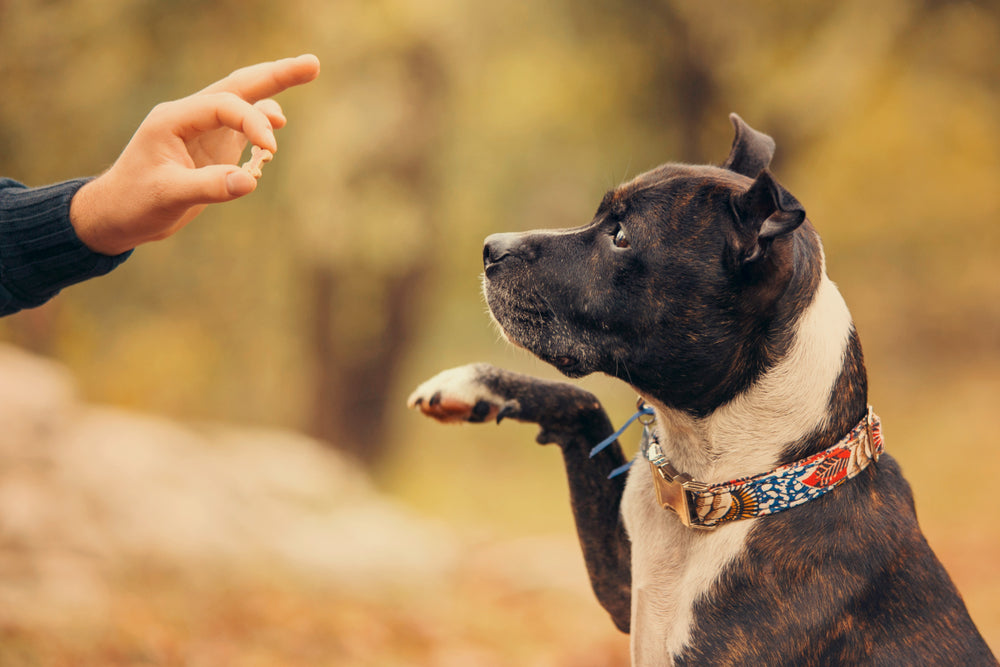Why Won’t Your Dog Stop Barking? 5 Reasons Explained
Posted by Don Hesh on Jan 26, 2020
It’s important to understand that barking is normal behaviour for dogs, imagine how you would communicate if you couldn’t understand a human language! Dogs use their voice for many purposes, including getting the attention of other dogs, a startling noise or behaviour or merely trying to communicate with their owners. It’s an essential part of their canine vocabulary.
Nonetheless, barking can become irritating for the owner as well as other surrounding people. Usually, it’s completely tolerable and not an issue. However, it can quickly become too much when the barking behaviour turns excessive. Even more importantly, it will almost always indicate an underlying problem the dog is experiencing in their environment. Understanding some of the common reasons will help you identify why your dog won’t stop barking. Once you pinpoint a potential cause, solving the problem and training your dog’s new behaviour will be much easier.
Your Dog is Protective or Territorial
When controlled and displayed only when necessary, protective behaviour can be an excellent thing. In fact, some owners take in a dog for this very purpose. The issue arises when a dog is not well accustomed to friendly humans, or animals, and perceives everything as a threat to its territory. You can identify this behaviour by how the dog reacts to what it sees as a potential threat. For example, they are barking at a stray cat in the backyard. As the cat moves to come closer, the barking gets louder and more intense. The dog is warding off a potential threat to its territory and owners and may appear alert or even trigger an aggressive response.
“The dog perceives everything as a threat to its territory.”
There are a few ways you can deal with this; one such route is positive reinforcement. You need to teach the dog that strangers are not a threat to them. For example, when a predictable visitor comes by, be it a friend or the postman, you could give the dog a treat. Make sure only to do this when they’re not barking, so they begin to associate this good behaviour with a reward. Not a threat that you need protecting from. You could also try getting a visitor to reward your dog with the treat themselves. Over time, your dog’s protective nature may become a force for good, not a nuisance.
They’re Barking Out of Fear
Dogs are smart creatures, but there’s a lot they can’t understand. This is probably one of the most logical reasons a dog will bark. They’re scared! It could be due to a threat, as described above. It could also be a loud noise, such as fireworks or a thunderstorm. Most dog owners would have experienced the dreaded doorbell problem, where their pet freaks out every time it goes off. It’s a reaction to a startling noise or situation that catches the dog’s attention. The best way to deal with this is to calm the situation down (don’t yell at them), typically by embracing them or distracting them with a toy or chewy. These situations can happen anywhere, so they’re hard to avoid. Improving your dog’s reaction to external conditions over time is the key.
Your Dog is Bored!
Unfortunately, we can’t always be there to entertain our little pals. While their owners are at work, the dog may feel they have nothing to do. They may resort to barking continuously as an outlet for frustration, alongside ruining the garden!
“A toy with food inside can be a motivating challenge for your pet, keeping them engaged for hours.”
The best way to deal with this is to find toys or puzzles that they enjoy playing with. A toy with food inside can be a motivating challenge for your pet, keeping them engaged for hours. You could also try a brisk morning walk. This exercise may also help tire out your dog so that they rest more throughout the day while you’re away.
They May be Experiencing Anxiety
Similar to being bored, dogs become attached to their owners. When they are left alone or have to deal with a new situation, such as moving to a new house, they may become confused or feel isolated. They need to feel comfortable when they’re by themselves. It’s best to start exposing them to time apart while they’re young. Experiment by putting them outside, or in another room while you are at home. Just make sure they don’t get bored! Also, remain calm when you see them again. If the anxiety is severe, you may need to consult a vet or professional trainer. Your dog’s mental state is crucial to their wellbeing.
Greeting or Attention Seeking
This reason is usually less severe. They might just be excited to see you or another animal. You’ll be able to tell as the barking is usually accompanied by a wagging tail and lively behaviour, such as jumping. If consistently rewarded, this barking may turn into an attention-seeking pattern. For example, they want to go outside and play, or they’re hungry. It’s important not to reward this behaviour as it will encourage excessive barking to get what they want.
Here’s a great video from Cesar Millan demonstrating how to calm and excited or demanding dog:
Put A Stop to the Barking
Those are just a few of the many reasons why your dog won’t stop barking. You must understand your dog’s situation to resolve the barking problem. It would be best if you always tried positive reinforcement techniques where possible; however, it’s not always going to be completely practical or efficient. Dog Gear supplies dog training collars designed with safety and effectiveness top-of-mind. Training collars are not harmful and can be a useful tool to train and help you and your dog achieve peace in a shorter time frame. We are proud to help countless dogs and owners live their best life!
